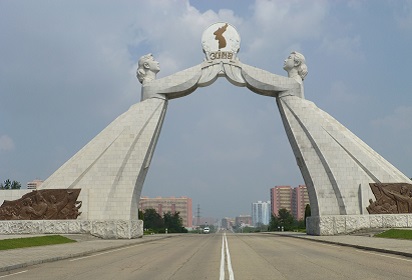Written by Hilary Bradt
To celebrate International Women’s Day on 8th March, we take a look at some of the most inspiring women in travel who are continuing to blaze the trail for future generations.
If we are to believe the media, we are on the brink of war with North Korea. And if we are to believe the media it is the North Korean leader who is unpredictable, paranoid, and largely to blame. Before my 18-day visit with a group from Regent Holidays last September I’m sure I would have gone along with this view. Now I’m inclined to think that the unpredictable, paranoid leader is across the pond in the USA.
So what was it actually like, being in the country generally defined as the most dangerous in the world? All I can say is that it confounded all expectations and I see North Korea now in a new light. Perhaps indeed I have been brainwashed, but I can truthfully say that I saw a lot of everyday life that wasn’t contrived for our visit (with the best will in the world the North Koreans can’t stage-manage every view seen from a bus-window on journeys that often took several fascinating hours). Poverty? Perhaps, but the workers’ houses we saw were well built and quite spacious; I’ve seen far more conspicuous poverty in ‘free’ countries. Hunger? Again, maybe, but the land is well farmed and seems productive. Many houses had a small kitchen garden, and the maize harvest painted every surface, pavement and roofs, orange as the cobs were laid out to dry in the sun. Miserable? Some, no doubt, but the families picnicking in the park and by the sea seemed to be enjoying themselves as much those in our country.
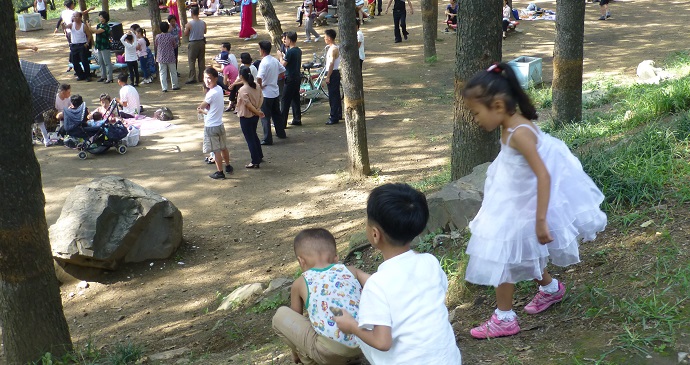
Were we watched every step of the way? Yes, but our guides were (mostly) relaxed and affable, the officials and soldiers smiley and sometimes keen to pose for photos, and the reality is that the visitor to the DPRK (Democratic People’s Republic of Korea) is treated with far more suspicion and incredulity from friends and acquaintances at home than from the North Koreans themselves. When I told people about my impending trip comments ranged from “I didn’t know you were allowed to go there” to the more frequent “Don’t say anything, will you!” and the universal jokes on return: “So they let you out then!” The consistently bad press rubs off. I phoned the guide from Regent Holidays to ask if our hotel rooms were likely to be bugged. “No” said Carl, adding “You’d have to be wilfully stupid to get into trouble there.” And that’s the key point. Of course you can get into trouble in North Korea, but only intentionally. The careless traveller will be safe, but their guide may not be. It’s the guides’ job to make sure that visitors are treated – and behave as – honoured guests. It’s our job to comply.
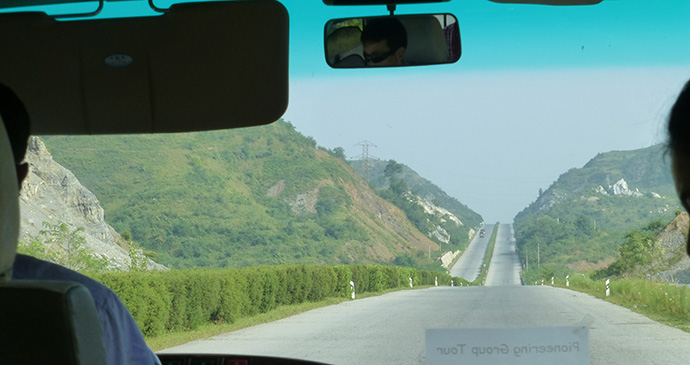
It’s our job to accept the visits to factories and leader-rich sites as much as to enjoy the magnificence of the Pyongyang Metro, the beauty of the mountain scenery around the country’s highest peak, Mt Paektu, and the long bus journeys where every mile gazing out of the window is rewarded by views of unguarded rural life. Every day there was something exhilarating to balance the dull bits. And in the DPRK even boredom is interesting and has its moments of serendipity. A food factory where the lobby shows a groundplan of the Great Leader’s route during his visit is balanced by an exuberant performance of patriotic songs led by the manager himself. The mind-numbing visit to a fertiliser factory was enlivened by my noticing that above the gate was a sculpture of a missile.
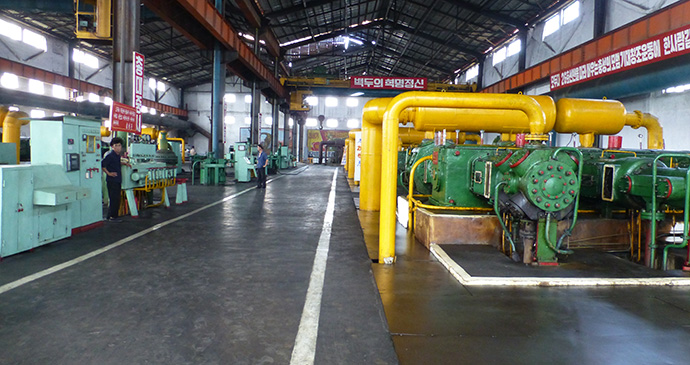
Highlights included our visits to two schools. I was particularly looking forward to this having been told that the previous group had arrived in time to watch the outdoor lesson that day: hand grenade practice. The first school we went to was a delight. I was able to chat to the friendly girls about our pets, and draw pictures of my guinea pigs. The second, a boy’s school (or rather a foreign language institute) was harder work. Or perhaps I made it harder by deflecting the eager question about how many British soldiers had been killed in World War II. I had no idea. He knew the shocking number of his compatriots who had died in the Korean War. “That’s sad” I said. Silence. He looked at me blankly. “War is sad, don’t you think?” Another blank look. “If there was another war would you join the army?” His face lit up: “Of course! I would want to defend my country!”
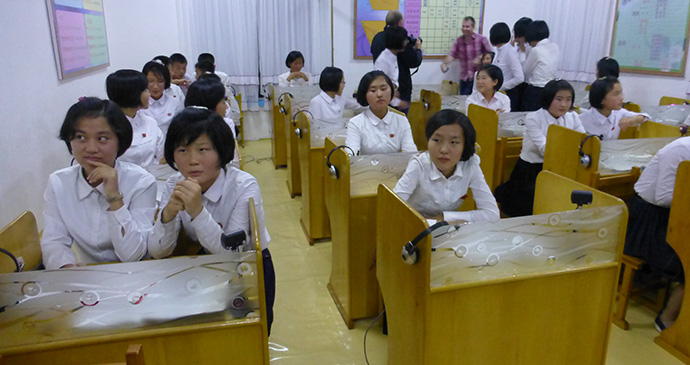
“The world’s most secretive nation” is a secret from even the most experienced traveller. We all know that veneration of their leaders, past and present, is part and parcel of life in the DPRK, but a little understanding of the thinking behind it helps one comply with the central theme of any visit: the bows. We presented flowers to statues, portraits, waxworks, and memorably the embalmed remains of the first and second Great Leaders, a total of 22 times, bowing on each occasion. Carl (the very experienced guide from Regent Holidays) described North Korea’s ideology as “socialist aspiring to communist” but to a less informed visitor it seems pure communist and the last remaining such nation in the world. That’s what makes it so interesting. There is free education, free healthcare, free housing, full employment and no income tax. Unique to North Korea is the ideology of Juche which translates as ‘Master of oneself’. The concept of Juche is complex; enough to know that it infuses daily life in North Korea and gives absolute power to its leader since “the Leader is the brain to the body of the masses and is the supreme representative and embodiment of their interests”.
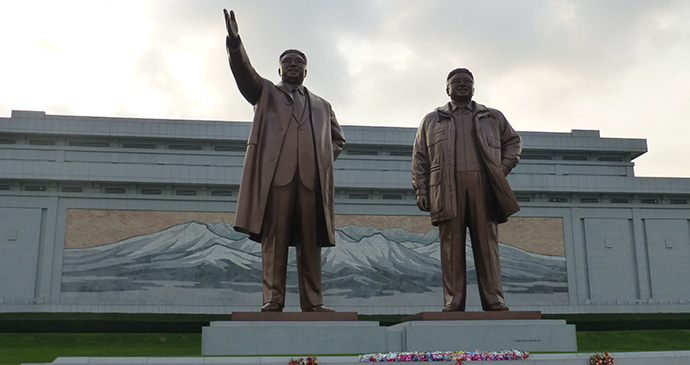
Since the ending of the Korean War in 1953 the people of the DPRK have been told they are the luckiest and happiest people in the world, and they owe it all to their Great Leaders. With no access to contradictory media it’s not hard to understand why this is seen as the truth. The English-language weekly Pyongyang Times invariably has a photo of Kim Jong-un on the front, invariably smiling, invariably surrounded by beaming officials, and doing leaderly things such as overseeing a successful missile test fire, or inspecting a factory or cooperative farm. My three copies are carefully folded so that no crease crosses The Supreme Commander’s image. When I bought my last copy in the bookshop of the Hotel Yanggakdo in Pyongyang before returning home, the shop assistant started wrapping it carefully in paper and string. “Oh there’s no need to wrap it!” I said. “Oh yes, I have to. Because of…” I didn’t hear the last bit, but I can guess.
Reading the paper was the closest I got to understanding the mindset of the North Koreans. I delighted in the hyperbole. For instance, the testing of a ballistic missile, widely and anxiously, reported in the Western Press, was a cause of great rejoicing. “…rockets blasted off in a row with thunderous explosions, soaring up into the sky… Kim Jong-un was greatly satisfied with the flawless, successful drill, and extended warm congratulations to the artillerymen…” The previous week he had been even more thrilled at the submarine-launched ballistic missile test. “He ordered the field of national defence science to put increased spurs to manufacturing nuclear weapons while concentrating all efforts on the development of means of their delivery, in order to cope with an unpredicted full-scale war, nuclear war, with the US imperialists.”
Unlike our tabloids the Pyongyang Times focuses almost entirely on good news – and all news is good news in the DPRK. Every face is a smiling face, every achievement is magnificent, and even the opening of a western-style restaurant is treated with appropriate deference. Under the heading “Eatery serving foreign delicacies” it describes the “hamburgers, varied in kind and exquisite in flavour” and that “diners marvel at the dexterity of cooks who bring forth the genuine flavour of foreign dishes”. Yum!
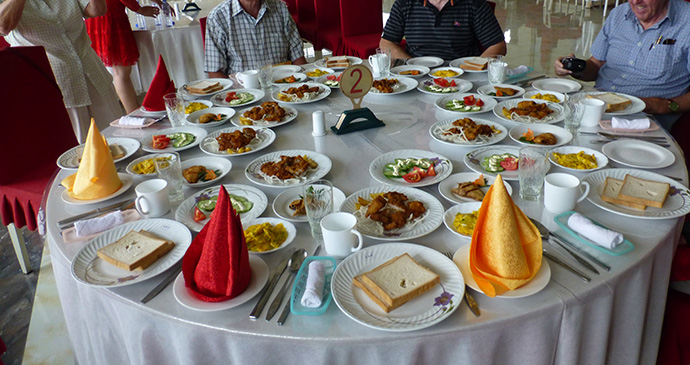
Meanwhile we marvelled at the range of Korean food. The fact that I lost weight on this trip was not so much because the food wasn’t tasty, it was, but the order that it arrived in. Twice a day we sat down at a table covered in little saucers of delicacies: meat, fish (often cold), salad, kimchee – always kimchee, the pickled cabbage – and a range of unidentifiable goodies arranged around a lazy susan turntable. We ate daintily, with chop sticks, or gave in and used a fork to help ourselves to the tastiest morsels. Then the soup arrived. Thin watery soup with noodles. Since I’d pretty much filled up with the contents of the little dishes, I guiltily left most of it. Then, when soup and savouries had been cleared away, and we had absolutely no more room to eat another thing, a big bowl of sticky rice arrived with nothing to add flavour to it. We very rarely had fresh fruit or vegetables.
Breakfast was the savoury dishes from the night before, with soup and perhaps with a cold fried egg. Occasionally, oh joy, we were given an omelette. Sometimes warm. Tea and coffee were in short supply. Half a cup grudgingly poured out, with the waitresses taking on a pained expression if we asked for more. Rooms often had tea-making facilities or a thermos of hot water so my ginseng tea bags were a useful standby.
In 18 days there were plenty of wonderful holiday experiences: a beautiful beach where we were the only swimmers, a lovely walk up to a waterfall surrounded by towering granite peaks, and North Korea’s first Half Marathon and 10k race held at a ski resort. Actually, they didn’t have enough entries for the half marathon, but the 10k went ahead with as much, if not more, celebration and aplomb than I’m accustomed to at home (if I have any regrets about this trip it’s that I didn’t give it a go). So we all had our favourite bits but would probably agree that the best, because it summed up North Korea in all its contradictions, was the Kaesong flood.
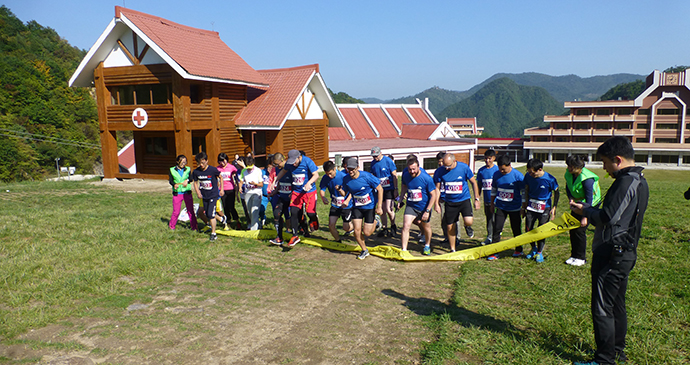
On our return to the town after visiting the DMZ we stopped for lunch and the clouds opened. Not just a shower but torrential rain. We dashed to the bus and shook the water off our clothes as our driver headed for Kaesong. The town was transformed. A large lake occupied the area that should have been the main street. Our driver bravely drove into it at speed; at the deepest part the engine died and flood water rushed under the door to find its level just below the top step. Our normally calm guides were shouting at each other, the driver jumped down into the waist-deep water, and we passengers looked around us relishing this new experience. We took photos of people riding their bikes through chest deep water or carrying them above their heads, while others tried to haul themselves and their bicycles onto the raised pavement beside the road. After about thirty minutes a red lorry appeared behind us, a rope was secured, and we were towed out backwards to dry land. Applause. The trouble was, we were the wrong side of the flood. So the helpers swapped the tow-rope to the front bumper and we were again pulled through the water. Then crrrrump! A huge jolt as the brakes or gears engaged and the front bumper was ripped away. Mayhem. “No photo!” shrieked our guide, so we put away our cameras and wondered what would happen next. North Korea is nothing if not efficient, and when it comes to ensuring that tourists are happy and safe, they are super-efficient. A van appeared and transported us to the hotel where a new bus was soon waiting so we could continue our sightseeing. But Carl had something to tell us. “It’s been reported that some of you were taking photos of the flood. I must ask you to delete them.” So we did. Before setting off in the new bus he repeated “Please make sure you delete those photos. We wouldn’t want the authorities to have to come to our rooms to examine each camera.” Indeed we wouldn’t.
So North Korea sometimes lives up to expectations but much more often confounds them. It’s so different, so extraordinary, that it’s worth making the effort to understand it beyond the headlines. It’s probably not as consistently bad as the media would have us believe, but certainly not as good as the local guides would have us believe.
The next month I made my annual trip to Madagascar. It was there that I realised what I had missed in North Korea: the sound of children’s laughter.
Want to learn more about North Korea? Check out our comprehensive guide:
